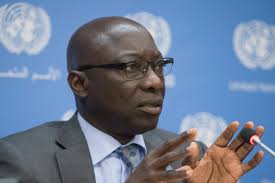The Special Adviser of the Secretary-General on the Prevention of Genocide, Adama Dieng, has urged the parties in South Sudan conflict not to hide perpetuators of serious crimes behind peace negotiations.
The top UN official made the remarks on Thursday at the headquarters of the United Nations in New York during a meeting with the South Sudan Council of Churches (SSCC) leaders to discuss the ongoing crisis.
The religious leaders, according to a statement released to the public, expressed concern over the continued deterioration of the human rights, humanitarian and economic situation in South Sudan.
The statement noted that the religious leaders have observed that the parties to the conflict, including government forces, continue to commit serious violations against the civilian population, including killings, rape and pillaging that in some cases could constitute atrocity crimes.
They urged the international community not to abandon South Sudan, but rather intensify advocacy with the parties to end the conflict.
The statement underscored the need for the international community to prioritize accountability for serious crimes that have been committed since the conflict broke out, noting that impunity continues to fuel the violence and serious violations and abuses.
Dieng commended the SSCC leadership for peace initiatives and pledged full support. He reiterated the importance of accountability to peace and reconciliation in South Sudan.
“The parties to the conflict in South Sudan should not hide behind peace negotiations to protect perpetrators of serious crimes. I call on the Transitional Government of National Unity and the African Union to expedite the establishment of the Hybrid Court,” partly reads the statement.




